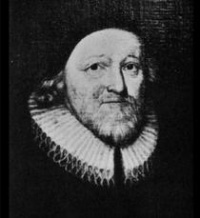Samuel Ward
From Textus Receptus
(Difference between revisions)
| Line 1: | Line 1: | ||
[[Image: Samuel Ward.JPG|200px|thumb|right|Samuel Ward]] | [[Image: Samuel Ward.JPG|200px|thumb|right|Samuel Ward]] | ||
| - | '''Samuel Ward''' (1577 — 1639) was an [[England|English]] academic and a master at the | + | '''Samuel Ward''' ([[1577 AD|1577]] — [[1639AD|1639]]) was an [[England|English]] academic and a master at the University of Cambridge. |
| - | Born in | + | Born in Haverhill, Suffolk, he attended Christ's College, Cambridge as a student, and was ultimately Master of Sidney Sussex College, Cambridge. He was a [[Puritan]] who wrote extensively on doctrinal issues. |
Ward was one of the scholars involved with the translation and preparation of the [[King James Version]] of the [[Bible]]. He served in the "Second Cambridge Company" charged with translating the [[Apocrypha]]. | Ward was one of the scholars involved with the translation and preparation of the [[King James Version]] of the [[Bible]]. He served in the "Second Cambridge Company" charged with translating the [[Apocrypha]]. | ||
Revision as of 14:21, 7 July 2009
Samuel Ward (1577 — 1639) was an English academic and a master at the University of Cambridge.
Born in Haverhill, Suffolk, he attended Christ's College, Cambridge as a student, and was ultimately Master of Sidney Sussex College, Cambridge. He was a Puritan who wrote extensively on doctrinal issues.
Ward was one of the scholars involved with the translation and preparation of the King James Version of the Bible. He served in the "Second Cambridge Company" charged with translating the Apocrypha.
Ward also designed and made the Double Deliverance, a woodcut.
Ward was the eldest of three brothers, all Puritans. One brother was Nathaniel Ward, whose book The Body of Liberties directly influenced to the first United States Constitution.

